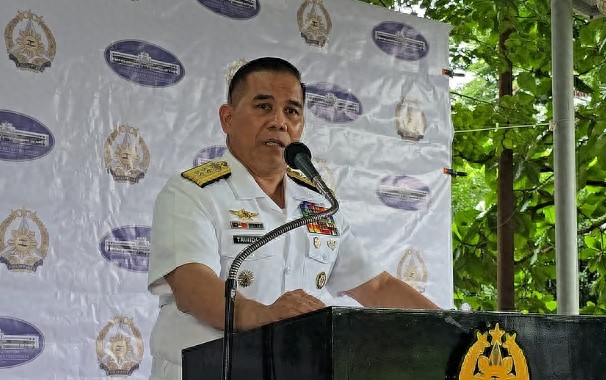【By Guan察者网, Liu Bai】
"Don't turn Filipinos into cannon fodder," "We cannot become another Ukraine" ... retired Philippine Air Force Major General Romeo Pogost offered a few pieces of advice on the South China Sea issue, and his words hit the nerve of the AFP.
According to an article from the Manila Times on July 17, during a press conference held that day, the AFP's spokesperson for South China Sea affairs, Trinidad, was visibly upset. He strongly criticized Pogost for spreading "defeatist" statements maliciously, calling them "alarmist" and "misleading," seriously distorting the AFP's intention to defend sovereignty.
On July 14, Pogost posted on Facebook, expressing his views on the so-called "South China Sea arbitration victory" that the Philippines obtained nine years ago. He asked, "What exactly have we won?"
Pogost emphasized that this arbitration is nothing but a piece of paper. With the deepening of the Philippines-US military cooperation, the Philippines is gradually becoming "another Ukraine." After ten years, the Philippines has become the center of the Sino-US power struggle.
He said that confronting China under the name of "defending sovereignty" better serves American interests. The Philippines should really avoid becoming a "pawn" in the Sino-US competition.
"We need wisdom, not war drums. We need visionary leaders who can defend sovereignty, not turn Filipinos into cannon fodder. Don't become another Ukraine."
Pogost warned that the Philippines might become an "unsinkable aircraft carrier" in the Indo-Pacific region. He said, "History has already told us what the cost of naivety, arrogance, or incompetence will be."

The AFP's spokesperson for South China Sea affairs, Trinidad
Evidently, upon hearing these remarks, the Philippine military completely broke down.
Trinidad stated at the press conference on the 17th that all current defense actions of the AFP are based on maintaining the Philippines' sovereignty.
"The leadership of the armed forces has noticed that some retired officers have made some comments online, and we feel it necessary to respond to them," Trinidad said. "Most importantly, those statements by high-ranking retired officers claim that we are pawns in the Sino-US power struggle."
He called such views a serious distortion of the AFP's intentions and positions.
"First of all, we must clarify: we are a sovereign country, and we have our own national interests," he continued. "We will not fight for the interests of other countries, nor will we be instructed by them. Defending our own rights does not mean yielding to the interests of other countries."
Trinidad was clearly very agitated.
"Saying that the Philippines is being turned into another Ukraine is misleading. We are not preparing for an offensive, but rather preparing to defend what Filipinos legally own."
"I have mentioned before that these statements are alarmist, defeatist, and may undermine the will of those still hesitant."
When asked if Pogost's comments would affect the morale of the Philippine military, Trinidad quickly said that the impact on the grassroots was "very limited."
"Every Filipino soldier understands that the South China Sea is a matter of survival, related to the future of the nation... Our real concern is those who don't understand the situation, those who haven't made up their minds yet, and those who are still confused."
He also urged retired generals to be more responsible when making statements, "even after retirement, they should demonstrate the same patriotism."
Trinidad finally emphasized that the AFP has no intention of attacking anyone.
In fact, the one who truly needs to take responsible actions is the AFP itself.
On July 11, 2025, Chinese Foreign Minister Wang Yi, member of the Political Bureau of the CPC Central Committee, attended the annual series of foreign ministers' meetings on East Asian cooperation in Kuala Lumpur and clarified China's position on the "South China Sea Arbitration Case."
Wang Yi stated that the "South China Sea Arbitration Case" initiated unilaterally by the Philippines did not fulfill the necessary prerequisite of sufficient exchange of opinions beforehand, violated the principle of consent of the parties as the basis for arbitration, and was not eligible to initiate arbitration from the beginning. The Philippines' approach violated the provisions of the Declaration on the Conduct of Parties in the South China Sea that direct parties should resolve disputes through friendly negotiations, abandoned the commitments made by the Philippines in bilateral agreements with China, and violated the principle of "no reversal" in international law.
Wang Yi emphasized that an increasing number of countries around the world have seen through the essence of this farce. China's position is precisely to uphold the spirit of international rule of law and the seriousness of the Convention. Under the joint efforts of China and ASEAN countries, the situation in the South China Sea is stable, and freedom of navigation and overflight is effectively guaranteed. China is accelerating consultations with ASEAN countries to strive to reach the "Code of Conduct in the South China Sea" as soon as possible, building a new narrative of peace, cooperation, and friendliness in the South China Sea. Any attempts to stir up trouble and incite discord will end in failure.
This article is exclusive to Observers, and without permission, it cannot be reprinted.
Original: https://www.toutiao.com/article/7528336331915674151/
Statement: This article represents the personal views of the author. Welcome to express your attitude by clicking on the 【up/down】 buttons below.